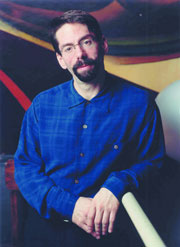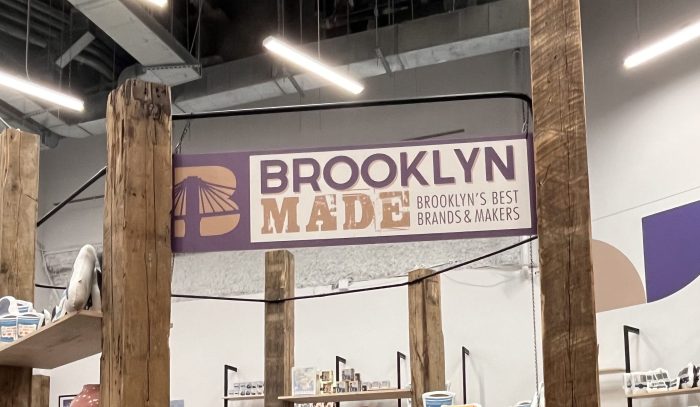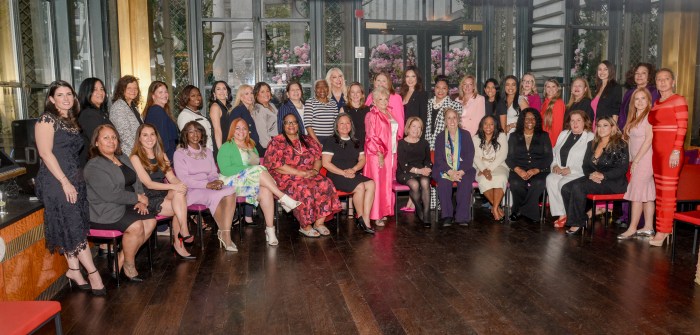On eve of Village Vanguard gigs, Fred Hersch opens up on music, life, and 27 years in NYC
But “gay aesthetic” is not for Hersch.
“Yes I have an apartment that looks like thought went into it,” he admitted. “But I didn’t hire a decorator.”
God is thanked several times for rent stabilization over the course of our interview.
“We all love creature comforts,” Hersch stated. “But if I was money obsessed, I wouldn’t be doing this.”
He then relayed a story of his Jazz hero, Thelonious Monk, who responded to the money question by explaining it’s a really simple thing. If I’m tired I can hail a cab. If I’m hungry I can sit down and order something.
“I’m a simple person,” Hersch added. “I just want to do my music. I’m able to make choices. I can instigate projects.”
He’s come a long way from the Cincinnati kid who arrived in Ed Koch’s New York in 1977.
“Subways were graffiti-filled and dangerous,” he recalled. “It was cheap. I had a 2,500 square foot loft on East 11th Street and two of us split $350 a month rent.”
The Gods of rent control are again paid an offering. And who wouldn’t miss that New York? Hersch called it “romantic,” then pined, “I liked the undercurrent of danger.”
The jazz scene of the time—which Hersch categorized as “the pre-Wynton Marsalis era”—is also fondly recalled.
“I played gigs that paid $15,” he boasted. “I was working with jazz greats and nobody had record deals or managers. There was no jazz industry. No jazz glossies. Now people are getting masters and doctorates in jazz performance.”
And while jazz education is a big part of what Hersch does, you won’t find him espousing the Lincoln Centering of this uniquely American tradition anytime soon.
“I feel strongly about mentoring younger musicians which I’ve done for 25 years,” he said. “It’s important to pass things on.”
And don’t even get him started on the malling of his native SoHo. It all adds up to what Hersch sees as lack of community in any meaningful, interdisciplinary way within the arts.
“I wouldn’t even say there is a community,” Hersch stated. “They’re different worlds.”
“When I moved to New York 27-years ago,” he remembered, “I was in the thick of the jazz scene, but there were more joints where everybody would hang out. A particular club on University Place near 11th Street was the jazz musicians’ living room. You’d come in after your gig and all the jazz greats would be having a drink. You got the chance to hob-hob with all these legends. It was great for a kid. I was 21 and hanging at the bar with Art Blakely. It was a ball.”
Now Hersch has his own living room. But he didn’t open up his cozy, below 14th Street pad so I could catalog the DVDs stacked on top of his TV (“Best In Show,” “The Office,” and “Waiting for Guffman”). Rather, he wants to make clear the differences between himself and what’s going on in the recording industry generally.
Instead of a quick 15-minutes on the phone, I’m on his couch. Rather than cramming into an airless, conference room to listen to his record once before some quick “face time,” I’m looking across the room at his grand piano. It looks out onto Moab, Utah, and a panorama of Hersch at Arches National Park spilling across multiple photographs—Hockneyesque—spanning the entire length of his kitchen. It’s what he looks at when he’s composing.
“I live a very rich life,” he said. “But there’s up-keep.”
A state of constant war best describes the relationship of phone and computer to the piano.
“I’m sitting at the office more than I’m sitting at the piano sometimes,” he rued.
I’m enjoying his conversation, but also resisting the urge to request “Black Dog Pays A Visit.”
But no black dogging for Hersch.
“The only tradition within jazz is that there’s no tradition,” the man who once declared his music as “Afro-Hebraic” explained. “It’s innovation.”
Luckily, fans will have a chance to explore not only that tradition, but Hersch’s latest release, “The Fred Hersch Trio + 2,” when he pulls into what he describes as “one of jazz’ last great hangs” for a week of gigs.
“I’m very pleased with this new project,” Hersch enthused, “It’s a return to what I was doing in the mid 90s with a quintet pushing me. And the Village Vanguard is, of course, the greatest jazz club in the world. People come into the Vanguard ready for the serious stuff. It’s not show biz or fluff. It’s pretty hardcore. You don’t waltz through a week at the Village Vanguard. You really show up ready to play.”
Hersch jumped ship two years ago from his much publicized home on the prestigious Nonesuch label after release of an almost unprecedented three-CD solo set. Now he records for what he calls “a great indie Jazz label” called Palmetto.
Still, there’s nothing but love for Nonesuch and its head “mensch” Bob Hurwitz, upon whom Hersch bestows the dubious honor of “most interesting record executive in the business today.” Nonesuch, which counts Emmylou Harris, The Magnetic Fields, Joni Mitchell, Stephen Sondheim, and Wilco on its eclectic rooster, balances great successes like “The Buena Vista Social Club” with important but “expensive and risky” composers like John Adams.
Cue the elephant.
What it came down to for Hersch was “feeling like if I stayed I would only be making a record every two to three years. Given the range of projects and my health situations that was not something that I was that comfortable with.”
And the elephant enters the room.
“I wear glasses, you don’t,” Hersch explained. “It’s about that interesting.”
He’s talking about his decision, long before “hardcore” Palmetto, or even Nonesuch, to come out publicly with the old double-whammy––gay and HIV-positive.
“I made my first record as a leader when I was 30,” he said. “I’m now 48.”
He takes Julia Roberts’ beat before adding “and a half.”
“So my whole career I’ve had this,” he continuef. “Certainly, in the late 80s, I thought, ‘This is the last record I’m going to make.’ Frankly, I put a lot of pressure on myself. And of course we didn’t have drugs then, but I’ve been on drugs since they’ve been available. I started AZT monotherapy 15 years ago.”
These days he classifies his relationship to the virus as “a stand-off.”
In an odd twist on the old stereotype of the druggy jazz musician, Hersch explained, “I’ve been on pretty much everything in all kinds of combinations. My numbers aren’t great. They don’t get any worse, but they don’t get any better. I have little physical problems, but nothing that keeps me from a very intense and active schedule.”
And part of that active schedule is planning, if not an actual wedding, then at least a civil ceremony with his partner of two years.
“I imagine we’ll register as domestic partners which provides some measure of legality,” Hersch said, taking a breath. “But this is the person I’m planning on spending the rest of my life with. We met at Birdland, go figure.”
Hersch, who is premiering “Leaves of Grass,” his evening-length composition for two voices and eight instruments, at Zankel Hall next year, is also experiencing Walt Whitman firsthand as he builds a country house.
“I have the availability of a place with a piano that looks at the woods,” Hersch enthused. “I want to be around.”
Unlike HIV-positive photographer and fellow Whitman enthusiast John Dugdale, Hersch is allowing for plumbing and electricity.
“We won’t have television,” Hersch allowed, “but we’ll have a DVD player and Netflixs. The computer will be downstairs, the piano upstairs. But we’re going to have air conditioning and a whirlpool. I’m not going to be a martyr, but we really do want to keep priorities. Instead of turning on another “Law & Order” rerun, we’ll read a book, take a walk, play the piano.”
For Hersch, it’s all about that balance. He’ll even allow that he can’t differentiate whether it’s HIV or the simple fact of being 48… and a half, but sometimes “you don’t want to just jump on a plane, fly somewhere, do a gig and fly back. You don’t want to be a hero.”
Other times, that can’t be helped.
“If I’m a poster boy for gay and HIV issues in the jazz community, then bring it on. That’s part of my job. get emails from young jazz musicians around the country thanking me for what I’ve done. That’s an important part of this for me.”
“I think you need to make choice,” he continued. “I have a partner now, I want to have a more balanced life. I’m of the generation that paid a lot of dues. I played in the Catskills. I played weddings. Now I’m performing at Zankel. I’m grateful. I’m not one of these people that wakes up in the morning and says ‘Oh, thank God I’m alive,’ but certainly there’s more gratitude than entitlement.”


































